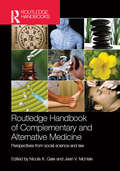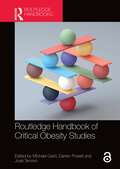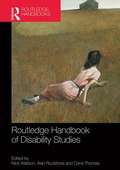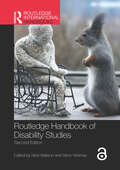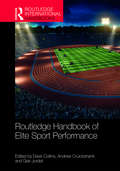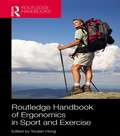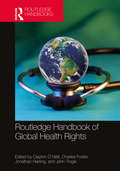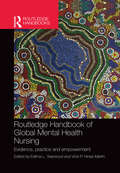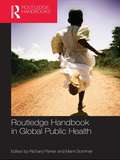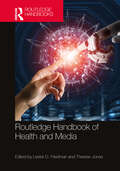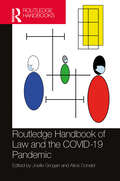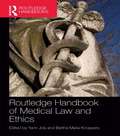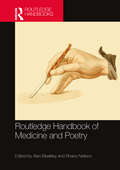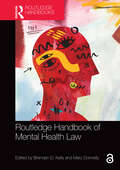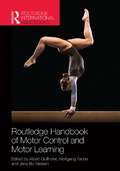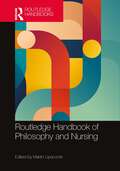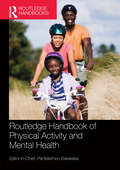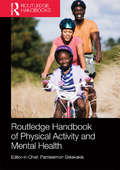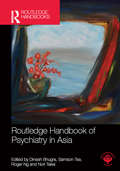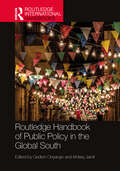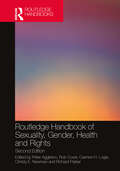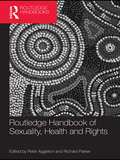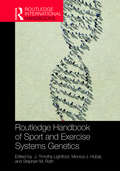- Table View
- List View
Routledge Handbook of Complementary and Alternative Medicine: Perspectives from Social Science and Law
by Jean V. McHale Nicola K. GaleThe provision and use of traditional, complementary and alternative medicine (CAM) has been growing globally over the last 40 years. As CAM develops alongside - and sometimes integrates with - conventional medicine, this handbook provides the first major overview of its regulation and professionalization from social science and legal perspectives. The Routledge Handbook of Complementary and Alternative Medicine draws on historical and international comparative research to provide a rigorous and thematic examination of the field. It argues that many popular and policy debates are stuck in a polarized and largely asocial discourse, and that interdisciplinary social science perspectives, theorising diversity in the field, provide a much more robust evidence base for policy and practice in the field. Divided into four sections, the handbook covers: analytical frameworks power, professions and health spaces risk and regulation perspectives for the future. This important volume will interest social science and legal scholars researching complementary and alternative medicine, professional identify and health care regulation, as well as historians and health policymakers and regulators.
Routledge Handbook of Critical Obesity Studies
by Michael GardThe Routledge Handbook of Critical Obesity Studies is an authoritative and challenging guide to the breadth and depth of critical thinking and theory on obesity. Rather than focusing on obesity as a public health crisis to be solved, this reference work offers divergent and radical strategies alongside biomedical and positivist discourses. Comprised of thirty nine original chapters from internationally recognised academics, as well as emerging scholars, the Handbook engages students, academics, researchers and practitioners in contemporary critical scholarship on obesity; encourages engagement of social science and related disciplines in critical thinking and theorising on obesity; enhances critical theoretical and methodological work in the area, highlighting potential gaps as well as strengths; relates critical scholarship to new and evolving areas of obesity-related practices, policies and research. This multidisciplinary and international collection is designed for a broad audience of academics, researchers, students and practitioners within the social and health sciences, including sociology, obesity science, public health, medicine, sports studies, fat studies, psychology, nutrition science, education and disability studies.
Routledge Handbook of Disability Studies
by Carol Thomas Alan Roulstone Nick WatsonThe Routledge Handbook of Disability Studies takes a multidisciplinary approach to disability and provides an authoritative and up-to-date overview of the main issues in the field around the world today. Adopting an international perspective and consisting entirely of newly commissioned chapters arranged thematically, it surveys the state of the discipline, examining emerging and cutting edge areas as well as core areas of contention. Divided in five sections, this comprehensive handbook covers: different models and approaches to disability how key impairment groups have engaged with disability studies and the writings within the discipline policy and legislation responses to disability studies and to disability activism disability studies and its interaction with other disciplines, such as history, philosophy and science and technology studies disability studies and different life experiences, examining how disability and disability studies intersects with ethnicity, sexuality, gender, childhood and ageing. Containing chapters from an international selection of leading scholars, this authoritative handbook is an invaluable reference for all academics, researchers and more advanced students in disability studies and associated disciplines such as sociology, health studies and social work.
Routledge Handbook of Disability Studies
by Nick Watson Simo VehmasThis fully revised and expanded second edition of the Routledge Handbook of Disability Studies takes a multidisciplinary approach to disability and provides an authoritative and up-to-date overview of the main issues in the field around the world today. Adopting an international perspective and arranged thematically, it surveys the state of the discipline, examining emerging and cutting-edge areas as well as core areas of contention. Divided in five parts, this comprehensive handbook covers: Different models and approaches to disability. How key impairment groups have engaged with disability studies and the writings within the discipline. Policy and legislation responses to disability studies and to disability activism. Disability studies and its interaction with other disciplines, such as history, philosophy, sport, and science and technology studies. Disability studies and different life experiences, examining how disability and disability studies intersects with ethnicity, sexuality, gender, childhood and ageing. Containing 15 revised chapters and 12 new chapters from an international selection of leading scholars, this authoritative handbook is an invaluable reference for all academics, researchers, and more advanced students in disability studies and associated disciplines such as sociology, health studies and social work.
Routledge Handbook of Disability Studies
by Nick Watson Simo VehmasThis fully revised and expanded second edition of the Routledge Handbook of Disability Studies takes a multidisciplinary approach to disability and provides an authoritative and up-to-date overview of the main issues in the field around the world today. Adopting an international perspective and arranged thematically, it surveys the state of the discipline, examining emerging and cutting-edge areas as well as core areas of contention.Divided in five parts, this comprehensive handbook covers: Different models and approaches to disability. How key impairment groups have engaged with disability studies and the writings within the discipline. Policy and legislation responses to disability studies and to disability activism. Disability studies and its interaction with other disciplines, such as history, philosophy, sport, and science and technology studies. Disability studies and different life experiences, examining how disability and disability studies intersects with ethnicity, sexuality, gender, childhood and ageing. Containing 15 revised chapters and 12 new chapters from an international selection of leading scholars, this authoritative handbook is an invaluable reference for all academics, researchers, and more advanced students in disability studies and associated disciplines such as sociology, health studies and social work.Chapter 6 of this book is freely available as a downloadable Open Access PDF at http://www.taylorfrancis.com under a Creative Commons Attribution-Non Commercial-No Derivatives (CC-BY-NC-ND) 4.0 license.
Routledge Handbook of Elite Sport Performance (Routledge International Handbooks)
by Dave Collins Andrew Cruickshank Geir JordetThe Routledge Handbook of Elite Sport Performance is the first book to examine a broad span of performance and support issues in contemporary elite sport; including coaching, sports science and medicine, leadership and management, operating in different societies, living in the system as a performer, and future developments in the domain. The book is written by authors with elite-level experience, expertise, success, and status across individual and team sports, including football, NFL, track and field athletics, rowing, and rugby, in professional, Olympic, and other elite domains. The book also considers the integration of systems at micro to macro levels, from working with individual athletes to developing national organisations and policy, and features in-depth case studies from real sport throughout. This is an essential reference for any researcher or advanced student with an interest in elite sport or applied sport science, from sport injury and sport psychology to sports coaching and sport policy. It is also an invaluable resource for coaches, managers, administrators, and policy-makers working in elite sport, offering them a "breadth first" guide to how and why specialists may work together for maximum effect.
Routledge Handbook of Ergonomics in Sport and Exercise (Routledge International Handbooks)
by Youlian HongErgonomics is concerned with the ‘fit’ between people and their work. With an increasing number of people becoming conscious about their health and participating in sport or physical activity, ergonomics has become an increasingly prominent concern within the sport and exercise sciences. From the design of footwear and artificial playing surfaces, to studies of proprioception by obese children , the way in which people interact with their environment - designed and natural – has important implications for performance sport and for the design of safe and beneficial forms of physical activity. The Routledge Handbook of Ergonomics in Sport and Exercise is the first book to offer a comprehensive and in-depth survey of cutting-edge scientific research into ergonomics in sport and exercise. Written by world-leading international scientists and researchers, the book explores key topics such as: Musculoskeletal adaptation to sports and exercise Environmental factors of injury and fatigue Load weight and performance Ergonomics in adapted sports and exercise Measurement in sports and exercise Modeling and simulation in ergonomics design Influence of playing surface, footwear and equipment design Bridging the gap between fundamental scientific research in sport and exercise and applications in sport and exercise contexts, this is an important reference for all advanced students, researchers and professionals working in sport and exercise science, kinesiology, sports technology, sports engineering, ergonomics, and product design.
Routledge Handbook of Global Health Rights
by Clayton Ó Néill, Charles Foster, Jonathan Herring, and John TingleThis book examines the idea of a fundamental entitlement to health and healthcare from a human rights perspective. The volume is based on a particular conceptual reasoning that balances critical thinking and pragmatism in the context of a universal right to health. Thus, the primary focus of the book is the relationship or contrast between rights-based discourse/jurisprudential arguments and real-life healthcare contexts. The work sets out the constraints that are imposed on a universal right to health by practical realities such as economic hardship in countries, lack of appropriate governance, and lack of support for the implementation of this right through appropriate resource allocation. It queries the degree to which the existence of this legally enshrined right and its application in instruments such as the International Covenant on Economic, Social and Cultural Rights (ICESCR) and the Universal Declaration of Human Rights (UDHR) can be more than an ephemeral aspiration but can, actually, sustain, promote, and instil good practice. It further asks if social reality and the inequalities that present themselves therein impede the implementation of laudable human rights, particularly within marginalised communities and cadres of people. It deliberates on what states and global bodies do, or could do, in practical terms to ensure that such rights are moved beyond the aspirational and become attainable and implementable. Divided into three parts, the first analyses the notion of a universal inalienable right to health(care) from jurisprudential, anthropological, legal, and ethical perspectives. The second part considers the translation of international human rights norms into specific jurisdictional healthcare contexts. With a global perspective it includes countries with very different legal, economic, and social contexts. Finally, the third part summarises the lessons learnt and provides a pathway for future action. The book will be an invaluable resource for students, academics, and policymakers working in the areas of health law and policy, and international human rights law.
Routledge Handbook of Global Mental Health Nursing: Evidence, Practice and Empowerment
by Edilma Yearwood Vicki Hines-MartinAwarded second place in the 2017 AJN Book of the Year Awards in Psychiatric and Mental Health Nursing. "I welcome, at long last, a book on global mental health targeted to nurses, the front-line health worker for billions of people around the world. The roles that nurses can, and should, play in mental health care are diverse and this book addresses both well-trod as well as emerging concerns across the continuum of care from promotion to prevention to treatment. Importantly, at the heart of this diversity is the foundation of compassion and care, the hallmark of the nursing profession." – Vikram Patel, Professor of International Mental Health and Wellcome Trust Principal Research Fellow in Clinical Science, Centre for Global Mental Health, London School of Hygiene and Tropical Medicine, UK Psychiatric disorders have consistently been identified as serious and significant global burdens of disease, yet meeting the needs of people in mental distress has not often been a priority in health care. This important reference work sets out the knowledge base for understanding the state of mental health care globally, and translating that into effective practice. The Handbook provides a historical and contemporary context of mental health care, identifies and discusses evidence-based standards of care and strategies for mental health promotion and explores the need to deliver care from interdisciplinary and community-based models, placing these imperatives within a human rights and empowerment framework. It is made up of four core sections which look at: Key and emerging issues that affect global mental health practice and research, including the social context of health; Evidence-based health promotion strategies for major areas of practice internationally; A range of country studies, reflecting different problems and approaches to mental health and mental health care internationally; and What constitutes empowering practice. The only comprehensive work looking at global perspectives on mental health nursing, this is an invaluable reference for all students, academics and professionals involved in mental health research with an interest in global or cross-cultural issues.
Routledge Handbook of Global Public Health
by Richard Parker Marni SommerAt the beginning of the twenty-first century, key public health issues and challenges have taken centre stage. They range from arsenic in drinking water to asthma among children and adults; from the re-emergence of cholera, to increasing cancer rates and other chronic diseases; from AIDS to malaria and hepatitis; from the crises faced by displaced or refugee populations to the new challenges that have emerged for reproductive health and rights. Like most aspects of contemporary life, these problems have been impacted by globalization. The issues that confront us are being shaped by evolving processes such as the growth of inequalities between the rich and the poor in countries around the world, the globalization of trade and commerce, new patterns of travel and migration, as well as a reduction in resources for the development and sustainability of public health infrastructures. The Routledge Handbook of Global Public Health explores this context and addresses both the emerging issues and conceptualizations of the notion of global health, along with expanding upon and highlighting the critical priorities in this rapidly evolving field. It is organized in ten main sections. The topics covered include: The transition from international to global health Structural inequalities and global public health Ecological transformation and environmental health in the global system Population and reproductive health Conflict, violence and emergencies in global public health Global public health policy and practice Global public health and development Global mental health Global access to essential medicines Health systems, health capacity, and the politics of global public health This comprehensive handbook will provide an authoritative overview for students, practitioners, researchers, and policy makers working in or concerned with public health around the globe.
Routledge Handbook of Health and Media
by Lester D. Friedman Therese JonesThe Routledge Handbook of Health and Media provides an extensive review and exploration of the myriad ways that health and media function as a symbiotic partnership that profoundly influences contemporary societies. A unique and significant volume in an expanding pedagogical field, this diverse collection of international, original, and interdisciplinary essays goes beyond issues of representation to engage in scholarly conversations about the web of networks that inextricably bind media and health to each other. Divided into sections on film, television, animation, photography, comics, advertising, social media, and print journalism, each chapter begins with a concrete text or texts, using it to raise more general and more theoretical issues about the medium in question. As such, this Handbook defines, expands, and illuminates the role that the humanities and arts play in the education and practice of healthcare professionals and in our understanding of health, illness, and disability. The Routledge Handbook of Health and Media is an invaluable reference for academics, students and health professionals engaged with cultural issues in media and medicine, popular representations of disease and disability, and the patient/professional health care encounter.
Routledge Handbook of Law and the COVID-19 Pandemic (Routledge Handbooks in Law)
by Joelle Grogan and Alice DonaldThe COVID-19 pandemic not only ravaged human bodies but also had profound and possibly enduring effects on the health of political and legal systems, economies and societies. Almost overnight, governments imposed the severest restrictions in modern times on rights and freedoms, elections, parliaments and courts. Legal and political institutions struggled to adapt, creating a catalyst for democratic decline and catastrophic increases in poverty and inequality. This handbook analyses the global pandemic response through five themes: governance and democracy; human rights; the rule of law; science, public trust and decision making; and states of emergency and exception. Containing 12 thematic commentaries and 25 chapters on countries of diverse size, wealth and experience of COVID-19, it represents the combined effort of more than 50 contributors, including leading scholars and rising voices in the fields of constitutional, international, public health, human rights and comparative law, as well as political science, and science and technology studies. Taking stock after the onset of global emergency, this book provides essential analysis for politicians, policy-makers, jurists, civil society organisations, academics, students and practitioners at both national and international level on the best, and most concerning, practices adopted in response to COVID-19 – and key insights into how states and multilateral institutions should reform, adapt and prepare for future emergencies.
Routledge Handbook of Medical Law and Ethics
by Yann Joly Bartha Maria KnoppersThis book explores the scope, application and role of medical law, regulatory norms and ethics, and addresses key challenges introduced by contemporary advances in biomedical research and healthcare. While mindful of national developments, the handbook supports a global perspective in its approach to medical law. Contributors include leading scholars in both medical law and ethics, who have developed specially commissioned pieces in order to present a critical overview and analysis of the current state of medical law and ethics. Each chapter offers comprehensive coverage of longstanding and traditional topics in medical law and ethics, and provides dynamic insights into contemporary and emerging issues in this heavily debated field. Topics covered include: Bioethics, health and human rights Medical liability Law and emerging health technologies Public health law Personalized medicine The law and ethics of access to medicines in developing countries Medical research in the genome era Emerging legal and ethical issues in reproductive technologies This advanced level reference work will prove invaluable to legal practitioners, scholars, students and researchers in the disciplines of law, medicine, genetics, dentistry, theology, and medical ethics.
Routledge Handbook of Medicine and Poetry
by Shane Neilson Alan BleakleyThe Routledge Handbook of Medicine and Poetry draws on an international selection of authors to ask what the cultures of poetry and medicine may gain from reciprocal critical engagement. The volume celebrates interdisciplinary inquiry, critique, and creative expansion with an emphasis upon amplifying provocative and marginalized voices.This carefully curated collection offers both historical context and future thinking from clinicians, poets, artists, humanities scholars, social scientists, and bio-scientists who collectively inquire into the nature of relationships between medicine and poetry. Importantly, these can be both productive and unproductive. How, for example, do poet-doctors reconcile the outwardly antithetical approaches of bio-scientific medicine and poetry in their daily work, where typically the former draws on technical language and associated thinking and the latter on metaphors? How does non-narrative lyrical poetry engage with narrative-based medicine? How do poets writing about medicine identify as patients? Central to the volume is the critical investigation of the consequences of varieties of medical pedagogy for clinical practice.Presenting a vision of how poetic thinking might form a medical ontology this thought-provoking book affords an essential resource for scholars and practitioners from across medicine, health and social care, medical education, the medical and health humanities, and literary studies.
Routledge Handbook of Mental Health Law (Routledge Handbooks in Law)
by Brendan D. Kelly and Mary DonnellyMental health law is a rapidly evolving area of practice and research, with growing global dimensions. This work reflects the increasing importance of this field, critically discussing key issues of controversy and debate, and providing up-to-date analysis of cutting-edge developments in Africa, Asia, Europe, the Americas, and Australia. This is a timely moment for this book to appear. The United Nations’ Convention on the Rights of Persons with Disabilities (2006) sought to transform the landscape in which mental health law is developed and implemented. This Convention, along with other developments, has, to varying degrees, informed sweeping legislative reforms in many countries around the world. These and other developments are discussed here. Contributors come from a wide range of countries and a variety of academic backgrounds including ethics, law, philosophy, psychiatry, and psychology. Some contributions are also informed by lived experience, whether in person or as family members. The result is a rich, polyphonic, and sometimes discordant account of what mental health law is and what it might be. The Handbook is aimed at mental health scholars and practitioners as well as students of law, human rights, disability studies, and psychiatry, and campaigners and law- and policy-makers.
Routledge Handbook of Mental Health Law (Routledge Handbooks in Law)
by Brendan D. Kelly and Mary DonnellyMental health law is a rapidly evolving area of practice and research, with growing global dimensions. This work reflects the increasing importance of this field, critically discussing key issues of controversy and debate, and providing up-to-date analysis of cutting-edge developments in Africa, Asia, Europe, the Americas, and Australia.This is a timely moment for this book to appear. The United Nations’ Convention on the Rights of Persons with Disabilities (2006) sought to transform the landscape in which mental health law is developed and implemented. This Convention, along with other developments, has, to varying degrees, informed sweeping legislative reforms in many countries around the world. These and other developments are discussed here. Contributors come from a wide range of countries and a variety of academic backgrounds including ethics, law, philosophy, psychiatry, and psychology. Some contributions are also informed by lived experience, whether in person or as family members. The result is a rich, polyphonic, and sometimes discordant account of what mental health law is and what it might be.The Handbook is aimed at mental health scholars and practitioners as well as students of law, human rights, disability studies, and psychiatry, and campaigners and law- and policy-makers.
Routledge Handbook of Motor Control and Motor Learning (Routledge International Handbooks)
by Gollhofer Albert Taube Wolfgang Bo Nielsen JensThe Routledge Handbook of Motor Control and Motor Learning is the first book to offer a comprehensive survey of neurophysiological, behavioural and biomechanical aspects of motor function. Adopting an integrative approach, it examines the full range of key topics in contemporary human movement studies, explaining motor behaviour in depth from the molecular level to behavioural consequences. The book contains contributions from many of the world´s leading experts in motor control and motor learning, and is composed of five thematic parts: Theories and models Basic aspects of motor control and learning Motor control and learning in locomotion and posture Motor control and learning in voluntary actions Challenges in motor control and learning Mastering and improving motor control may be important in sports, but it becomes even more relevant in rehabilitation and clinical settings, where the prime aim is to regain motor function. Therefore the book addresses not only basic and theoretical aspects of motor control and learning but also applied areas like robotics, modelling and complex human movements. This book is both a definitive subject guide and an important contribution to the contemporary research agenda. It is therefore important reading for students, scholars and researchers working in sports and exercise science, kinesiology, physical therapy, medicine and neuroscience.
Routledge Handbook of Philosophy and Nursing
by Martin LipscombPhilosophy offers a means of unpacking and grappling with important questions and issues relevant to nursing practice, research, scholarship, and education. By engaging in these discussions, this Handbook provides a gateway to new understandings of nursing. The Handbook, which is split loosely into seven sections, begins with a foundational chapter exploring philosophy’s relationship to and with nursing and nursing theory. Subsequent sections thereafter examine a wide range of philosophic issues relevant to nursing knowledge and activity. Philosophy and nursing, philosophy and science, nursing theory. Nursing’s ethical dimension is described. Philosophic questions concerning patient care are investigated. Socio-contextual and political concerns relevant to nursing are unpacked. Contributors tackle difficult questions confronting nursing. Difficulties around speech, courage, and race/otherness are discussed. Philosophic questions pertaining to scholarship, research, and technology are addressed. International in scope, this volume provides a vital reference for all those interested in thinking about nursing, whether students, practitioners, researchers, or educators.
Routledge Handbook of Physical Activity and Mental Health
by Jennifer L. Etnier Panteleimon Ekkekakis Jasper A.J. Smits Dane B. Cook Lynette L. Craft S. Nicole Culos-Reed Mark Hamer Kathleen A.Martin Ginis Justy Reed Michael UssherA growing body of evidence shows that physical activity can be a cost-effective and safe intervention for the prevention and treatment of a wide range of mental health problems. As researchers and clinicians around the world look for evidence-supported alternatives and complements to established forms of therapy (medication and psychotherapy), interest in physical activity mounts. The Routledge Handbook of Physical Activity and Mental Health offers the most comprehensive review of the research evidence on the effects of physical activity on multiple facets of mental health. Written by a team of world-leading international experts, the book covers ten thematic areas:physical activity and the ‘feel good’ effectanxiety disordersdepression and mood disordersself-perceptions and self-evaluationscognitive function across the lifespanpsychosocial stresspainenergy and fatigueaddictionsquality of life in special populations.This volume presents a balanced assessment of the research evidence, highlights important directions for future work, and draws clear links between theory, research, and clinical practice. As the most complete and authoritative resource on the topic of physical activity and mental health, this is essential reading for researchers, students and practitioners in a wide range of fields, including clinical and health psychology, psychiatry, neuroscience, behavioural and preventive medicine, gerontology, nursing, public health and primary care.
Routledge Handbook of Physical Activity and Mental Health (Routledge International Handbooks Ser.)
by Panteleimon EkkekakisA growing body of evidence shows that physical activity can be a cost-effective and safe intervention for the prevention and treatment of a wide range of mental health problems. As researchers and clinicians around the world look for evidence-supported alternatives and complements to established forms of therapy (medication and psychotherapy), interest in physical activity mounts. The Routledge Handbook of Physical Activity and Mental Health offers the most comprehensive review of the research evidence on the effects of physical activity on multiple facets of mental health. Written by a team of world-leading international experts, the book covers ten thematic areas: physical activity and the ‘feel good’ effect anxiety disorders depression and mood disorders self-perceptions and self-evaluations cognitive function across the lifespan psychosocial stress pain energy and fatigue addictions quality of life in special populations. This volume presents a balanced assessment of the research evidence, highlights important directions for future work, and draws clear links between theory, research, and clinical practice. As the most complete and authoritative resource on the topic of physical activity and mental health, this is essential reading for researchers, students and practitioners in a wide range of fields, including clinical and health psychology, psychiatry, neuroscience, behavioural and preventive medicine, gerontology, nursing, public health and primary care.
Routledge Handbook of Psychiatry in Asia
by Dinesh Bhugra Samson Tse Roger Ng Nori TakeiGeographically and demographically Asia is a huge region with a large number of societies and cultures, each affected by their own unique problems including over-population, major natural disasters, poverty and changing social and economic factors. Inevitably this means that different mental health needs have developed across the region. Colonialism, globalization, industrialization and urbanization have brought major demographic and cultural shifts in the region but clinical mental health practices and services and societal attitudes to mental health issues vary enormously. This handbook surveys the state of the current psychiatric care field across the whole Asia-Pacific region. Focusing on individual countries, each chapter will include: A summary of factors affecting the practice and provision of psychiatric care, including cultural attitudes to mental health issues Coverage of the conceptualisation, causation and prevalence of mental health issues in society An overview of mental health care services and systems available and workforce training Coverage of country specific innovative practices and folk therapies As the first major reference work on psychiatric care in Asia this book is an essential resource for scholars and students researching mental health in Asia as well as psychiatrists and other mental health professionals working in the region.
Routledge Handbook of Public Policy in the Global South (Routledge International Handbooks)
by Ishtiaq Jamil Gedion OnyangoThis important new handbook provides a comprehensive assessment of contemporary public policy and governance in the Global South. It offers incisive comparative analyses and presents policy-specific case studies from across Asia, Latin America, Middle East, and Africa. The aim is to inform future governance research, policy, and practice in these regions.This book is timely as it responds to how governments in the Global South are dealing with recent complex series of challenges and crises of the 21st Century. These range from the pressures of a global pandemic to the impacts of climate change, democratic backsliding, deteriorating public services, and the realignments in the international political economy following the rise of China. In doing so, it reflects on the political transformations, global convergences, and underlying regional, as well as national, trajectories that have taken place recently, focusing on among others: Democratic governance and institutional trust Public service delivery, motivation, and governance outcomes Policy crises, disaster management, and climate change Policy successes and failures Policy innovations, digitalisation, and policy research in the Global South Different authors bring together varied and specialised perspectives and experiences, which are important for researchers, practitioners, and policymakers wishing to understand emerging governance models, innovations, and challenges within the Global South.
Routledge Handbook of Sexuality, Gender, Health and Rights
by Richard Parker Peter Aggleton Rob Cover Carmen H. Logie Christy E. NewmanThoroughly updated with over 30 newly written chapters, this edition of the Routledge Handbook of Sexuality, Gender, Health and Rights brings together academics and practitioners from around the world to provide an authoritative and up-to-date account of the field. Social researchers and their allies have worked hard in past decades to find new ways of understanding sexuality in a rapidly changing world. Growing attention is now given to the way sexuality intersects with other structures such as gender, age, ethnicity/race and disability, and increasing value is seen in a positive approach focused on ethics, pleasure, mutuality and reciprocity. This Handbook explores: theory, politics and early development of sexuality studies ways in which language, discourse and identification have become central to research on sex, sexuality and gender key issues across the broad media and digital ecology, demonstrating the centrality of representation, communication and digital technologies to sexual and gender practices research focusing on the body and its sexual pleasures work on forms of inequality, violence and abuse that are linked to sex, gender and sexuality The Handbook is an essential reference for researchers and educators working in the fields of sexuality studies, gender studies, sexual health and human rights, and offers key reading for mid-level and advanced students.
Routledge Handbook of Sexuality, Health and Rights
by Peter AggletonThe last two decades have witnessed an explosion of research on sexuality as the social sciences have worked to find new ways of understanding a rapidly changing world. Growing concern for issues such as population, women's and men's reproductive health, and the HIV and AIDS pandemic, has since provided new legitimacy for work on sexuality, health and rights.A detailed and up-to-date reference work, The Handbook of Sexuality, Health and Rights provides an authoritative overview of the main issues in the field today. Leading academics and practitioners are brought together to reflect on past, present and future approaches to understanding and promoting sexual health and rights. Divided into nine parts, it covers:Pioneering beginningsLanguage, discourse and sexual categories From sexuality to healthThe reproductive imperative How to have sex in an epidemicThe choreography of sex The darker side of sex From sexual health to sexual rights Struggles for erotic justice This handbook surveys the state of the discipline and offers an examination and discussion of emerging, controversial and cutting edge areas. It is an essential reference for academics and researchers in the fields of sexuality studies, sexual health and human rights, and offers key reading for more advanced students.
Routledge Handbook of Sport and Exercise Systems Genetics (Routledge International Handbooks)
by Stephen M. Roth J. Timothy Lightfoot Monica J. HubalTechnological advances over the last two decades have placed genetic research at the forefront of sport and exercise science. It provides potential answers to some of contemporary sport and exercise’s defining issues and throws up some of the area’s most challenging ethical questions, but to date, it has rested on a fragmented and disparate literature base. The Routledge Handbook of Sport and Exercise Systems Genetics constitutes the most authoritative and comprehensive reference in this critical area of study, consolidating knowledge and providing a framework for interpreting future research findings. Taking an approach which covers single gene variations, through genomics, epigenetics, and proteomics, to environmental and dietary influences on genetic mechanisms, the book is divided into seven sections. It examines state-of-the-art genetic methods, applies its approach to physical activity, exercise endurance, muscle strength, and sports performance, and discusses the ethical considerations associated with genetic research in sport and exercise. Made up of contributions from some of the world’s leading sport and exercise scientists and including chapters on important topical issues such as gene doping, gender testing, predicting sport performance and injury risk, and using genetic information to inform physical activity and health debates, the handbook is a vital addition to the sport and exercise literature. It is an important reference for any upper-level student, researcher, or practitioner working in the genetics of sport and exercise or exercise physiology, and crucial reading for any social scientist interested in the ethics of sport.
